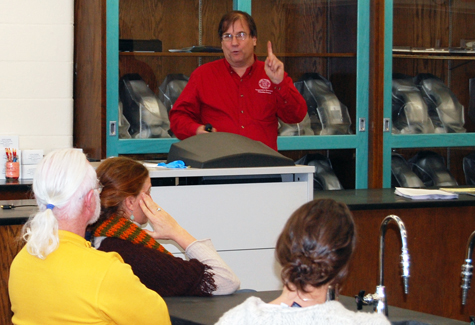30 years later, Suffolk farmers still trying to fight the beetle

In 1979, Suffolk farmers were forced to stop using the pesticide Temik to rid their crops of the Colorado potato beetle after scientists found that the chemical had seeped into the groundwater, tainting residents’ drinking water.
Farmers, left with the beetles, struggled to find a new way to protect their potatoes, tomatoes and eggplants.
Three years later, farmers, still plagued by the beetle problem, gathered for Suffolk County’s first Long Island Agricultural Forum, at which they learned about unconventional methods to control the relentless pests, such as vacuuming them up and burning them.
The 30th annual forum was held just last week at Suffolk County Community College’s Eastern Campus. The farmers who met there on Jan. 13 and 14, were still struggling with the Colorado potato beetle and still eager for new ways of controlling the insects.
Sponsored by the Long Island Farm Bureau and the Cornell Cooperative Extension, the two-day conference featured 13 programs on the potato beetle problem and other current agricultural issues, from dealing with root rot and patrolling for vineyard-threatening insect pests to safe agricultural practices and business and estate planning.
Forum program director Dale Moyer gave a refresher course on managing that Colorado potato beetle. It’s a talk that’s been given year after year at the agricultural forum. “There is no silver bullet in terms of how to get rid of the potato beetle,” he said. “It’s very hard.”
When vacuuming beetles off the crops with a tube attached to a tractor doesn’t work, Mr. Moyer recommended digging trenches around potato fields and lining the trenches with plastic. Beetles slide into the trench and can’t get out. They have wings but, for some reason, very few of them fly out, Mr. Moyer said.
A third method is burning the beetles with propane torches, which should not done with eggplants or tomatoes because it would damage those delicate crops. Tough-skinned potatoes can take it.
“When you have desperate times, you do desperate things,” Mr. Moyer said.
During a session on sustainable agriculture, Dr. Steven McKay, a resource educator at Cornell Cooperative Extension, spoke about uncommon fruits that have potential for commercialization. Many of the fruits Mr. McKay discussed, including the quince and the mountain ash, don’t need to be sprayed with pesticides.
A downside, Mr. McKay warned the farmers, is that these uncommon fruits may be hard to market. “People don’t know what they are,” he said. “You might have to do a lot of taste tests.”
Fred Lee, a certified organic grower who attended the session, said he would consider growing some of the unusual fruits. “I’m a small organic grower, and smaller growers tend to have to find a niche,” he said.


